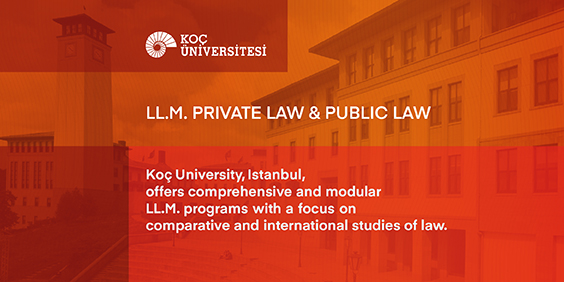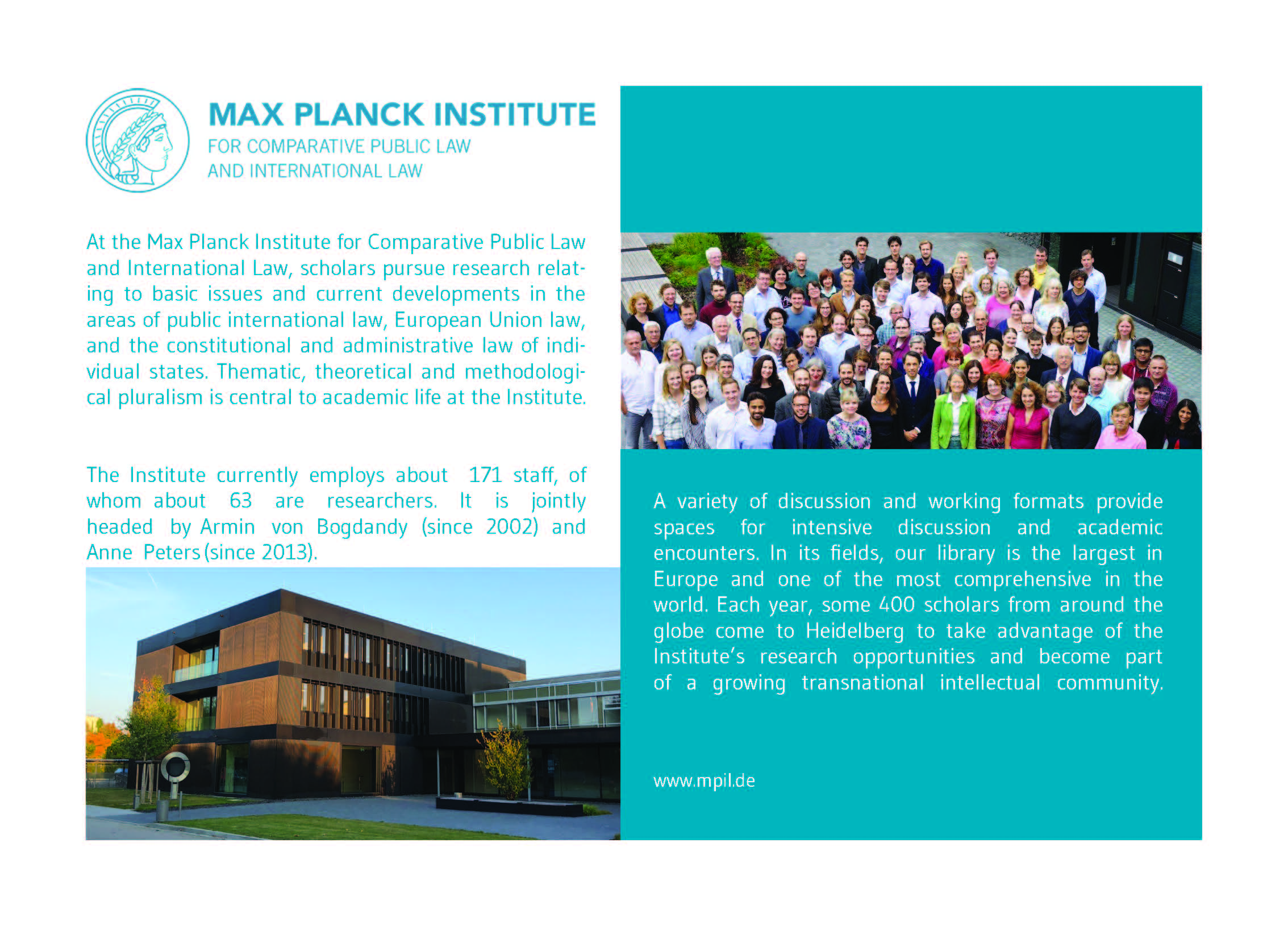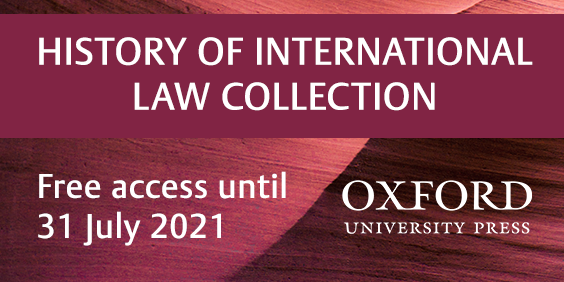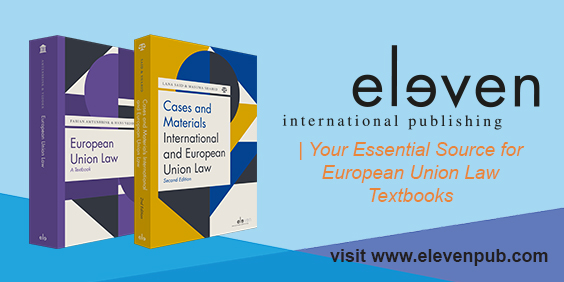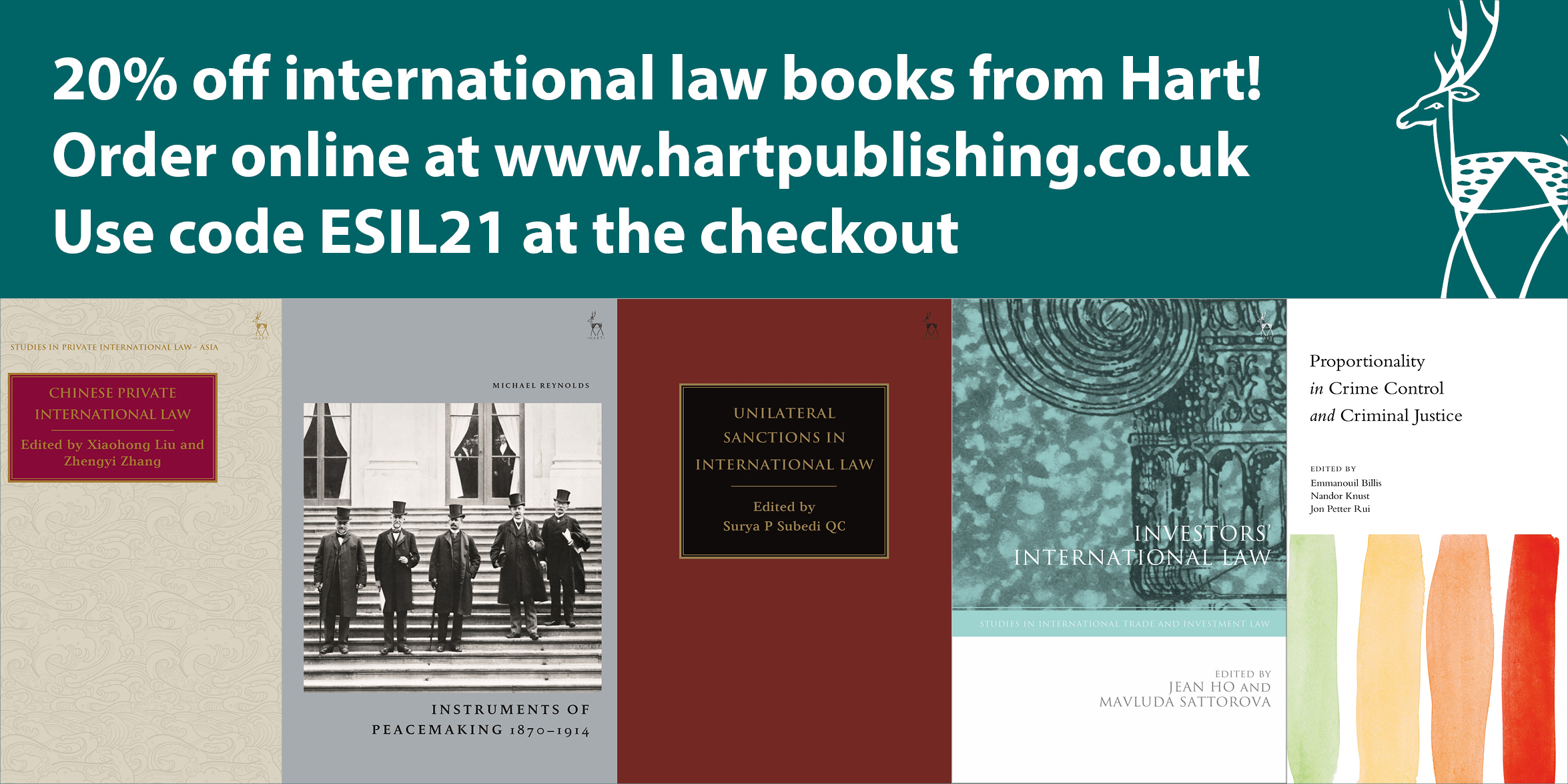ESIL Newsletter – Summer 2021
Editor: Sandrine Maljean-Dubois (University of Aix-Marseille)
 In this issue
In this issue
- Message of the President
- Guest Editorial by Aslan Abashidze: Maintaining outer space as a sphere of international cooperation
- What’s Going On?
- Meet an ESIL Member
- ESIL Teaching Corner
- Recent ESIL Events
- ESIL Series
- ESIL Reflections
- 2021 ESIL Satisfaction Survey
- News from Interest Groups
- Welcome to our new ESIL lifetime member
1. Message of the President
 As this issue was going to press, the news of the passing of James Crawford reverberated across the community of international lawyers. On behalf of the ESIL, I cannot but share the sadness in the loss of an outstanding figure of international law. Professor, practitioner, judge, colleague, friend, James Crawford will be remembered through his achievements in international law as one of the shapers of international law of our times. The Society joins in the tributes from across the world, from Cambridge to Sydney, from The Hague to New York and Geneva, from colleagues, friends and disciples, and we will have the opportunity to pay a special tribute to James Crawford in due time.
As this issue was going to press, the news of the passing of James Crawford reverberated across the community of international lawyers. On behalf of the ESIL, I cannot but share the sadness in the loss of an outstanding figure of international law. Professor, practitioner, judge, colleague, friend, James Crawford will be remembered through his achievements in international law as one of the shapers of international law of our times. The Society joins in the tributes from across the world, from Cambridge to Sydney, from The Hague to New York and Geneva, from colleagues, friends and disciples, and we will have the opportunity to pay a special tribute to James Crawford in due time.
Looking forward, the 16th Annual Conference of the Society, after being postponed last September, will take place in Stockholm from 9 to 11 September 2021. This Conference, in hybrid format, will be one of the first main international law events to be also held in person, for those able to travel. After many months of ‘zoom isolation’, we look forward to engaging with ESIL members and participants in the great programme prepared by our Colleagues in Stockholm. Under the overarching theme of the Conference: ‘Changes in international law-making: actors, processes, impact’, the ‘fabrication’ of international law, its processes and changes will be examined and discussed: from new forms of law-making, to new actors in lawmaking, including domestic actors and the impact of new technologies in the law-making process, these themes will be fleshed out in different areas including the law of the sea, sustainable development, international peace and security, human rights, the global economy, international institutions, and cyberspace. In addition to the main conference, our vibrant IGs have organized some very interesting pre-Conference events. Registrations have already opened, so please visit the Conference website. We hope to see many members in Stockholm in person, circumstances permitting.
The Society ‘met’ in Catania, virtually, on 15-16 April for the Annual ESIL Forum organized by the Department of Law of the University of Catania, with the theme: Solidarity: The Quest for Founding Utopias of International Law. This was a very well-attended on-line event with many interesting discussions, giving voice especially to young scholars. We wish to warmly thank Adriana di Stefano and all the Catania colleagues, for their efforts in ensuring a successful Forum!
After Stockholm, the 2022 ESIL Research Forum will take place on 31 March – 1 April 2022 and will be hosted by the Glasgow Centre for International Law and Security at the University of Glasgow, with the topic: “International Law and Global Security: Regulating an Illusion?”. The Organising Committee has already done its preparatory work and the call for papers in now available and the deadline for submissions is on Thursday, 30 September 2021.
I would also like to take this opportunity to inform members that our Society is continuing to strengthen its traditional ties with the European Journal of International Law, and we have been liaising with the Editors of the Journal on ways to enhance cooperation and mutual visibility.
On a different note, presidents of Colleague Societies met in a virtual ‘breakfast meeting’ that took place during the 2021 Annual Conference of the American Society of International Law, and we had the opportunity to discuss issues of common interest to all societies of international law. In this context, the ESIL looks forward to further interactions and collaborations with all sister societies: the ‘voice’ of international law is universal.
Finally, as this is my last contribution to the ESIL Newsletter, some words, and a farewell. Having had the opportunity to serve as President, let me say that the Society takes seriously the respect for its governance rules and procedures, which frame both the Board’s and the Interest Groups’ activities. Our commitment towards a collective spirit of collaboration among our members and towards transparency remain principles which guide our work. I want to thank my colleagues on the Board for all their efforts and hard work in this collaborative process. The Board remains, as always, open to ideas and suggestions from ESIL membership on ways to improve its work.
It has been a great privilege and a pleasure to serve the Society as President for the past two years. I look forward to meeting you at future events.
Photini Pazartzis
ESIL President
2. Guest Editorial – Maintaining outer space as a sphere of international cooperation
 Aslan Abashidze
Aslan Abashidze
Despite the difficulties bonded with the COVID-19, the international community celebrated the 60th anniversary of the first “envoy of mankind” to outer space (Article V of the Outer Space Treaty, 1967 (hereinafter – the OST).
Five international agreements on space activities have been adopted in a relatively short period since the Declaration of Legal Principles (UNGA Res. 1962 (1963)). They form the basis of international space law: the OST; the Rescue Agreement, 1968; the Liability Convention, 1972; the Registration Convention, 1975; the Moon Agreement, 1979.
These international treaties both established the basic principles that States parties must follow, and the international legal responsibility of States for national activities in outer space.
The past ten years have demonstrated an increase in political and legislative actions at the national level, and an intensification of unilateral diplomatic efforts to seek “allies” in the exploration of deep space and the resources of the Moon, Mars, comets, asteroids and other celestial bodies. It also reflects a refusal to further participation in international treaties on missile defense, “open skies”, and a decline in constructive approach in the UN space negotiating arenas established to express Article I of the OST “shall be carried out for the benefit and in the interests of all countries…”
There are attempts to “fill in” the “gaps” of the OST with the practice of a limited number of States and their “rules”. This completely ignores not only the key provisions of the OST, and the rules of international treaty law, but also extremely important provisions of the Moon Agreement, 1979, to which no one permanent member State of the Security Council is a party, primary responsible for maintaining and strengthening of international security.
There is also a selective recognition of the importance of other international agreements to back up their unilateral actions, primarily – the Rescue Agreement, 1968.
Such a unilateral position ignores all possible negative consequences for all mankind warning in Article IX of the OST, that participating States “shall be guided by the principle of cooperation and mutual assistance…” and “conduct exploration of them so as to avoid their harmful contamination and also adverse changes in the environment of the Earth resulting from the introduction of extraterrestrial matter…” in the exploration of outer space, including the Moon and other celestial bodies.
Geopolitical confrontation of the world’s leading powers (which are also leading space powers) cannot obscure their vulnerability to a global threat, such as the COVID-19, which implies their awareness of the need to act in concert in the field of exploration of space and its resources as “the province of all mankind” (Article I of the OST) and not as a possible threat to the well-being of the Earth and its inhabitants, who are homo sapiens.
An alternative to unilateral actions of the leading space powers, which are fraught with the militarization of space, is the experience of joint space exploration through the ISS, where modules of the US, Russia and the ESA are placed and operate based on equal participation.
3. What’s Going On?
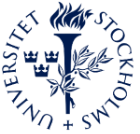 2021 ESIL Annual Conference – Registration is open!
2021 ESIL Annual Conference – Registration is open!
The XVI Annual Conference of the European Society of International Law in Stockholm on 9-11 September 2021 will be a hybrid conference with panellists generally onsite at the venue, while other participants can follow onsite or online. The designated conference platform will not only serve those who follow the conference online but it will also enrich the experience of onsite participants at the venue, including by facilitating contacts and interaction between participants.
This format brings challenges, including the fact that the pandemic is still raging. Nevertheless, we are excited to be one of the first academic conferences after the lockdowns in our part of the world, and we hope to be able to contribute to what we believe to be the future in scholarly conferencing. We invite you all to take part in this change.
Registration is now open. Participants can choose between onsite and online presence. We have generous “downgrade” and ”upgrade” options which allow participants to change their registration until 15 August. If restrictions will apply, priority will be given to those who have registered for live participation, in the order of registration.
We hope to see you safely in September!
 2022 ESIL Research Forum – the Call for Paper is now available!
2022 ESIL Research Forum – the Call for Paper is now available!
The 2022 ESIL Research Forum will take place on 31st March-1st April 2022 in Glasgow. It will be hosted by the Glasgow Centre for International Law and Security (GCILS) at the University of Glasgow. Under the theme of “International Law and Global Security: Regulating an Illusion?”, the Research Forum will address on one of the major themes of 21st century international law. It will look at global security as a dynamic, complex and volatile notion, asking how international law contributes to debates about global security, and how global security concerns shape international law. The Call for Papers is available! The deadline for submissions is 30 September 2021. Watch the ESIL ‘news channels’ or follow the organisers on twitter @UofGCILS for more information!
- The list of all the other ESIL events can be found here
4. Meet an ESIL Member
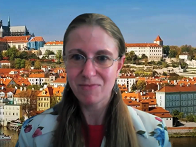
This is a new initiative for our members to get to know each other.
You can find the video introducing the ESIL Secretary General: Veronika Bilkova here.
5. ESIL Teaching Corner
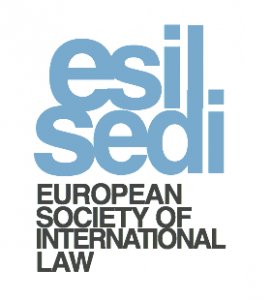
As an ESIL member, you have access to the ESIL Teaching Corner, which is an online resource for ESIL members to share syllabi, module outlines, reading lists, and other international law teaching materials and tools.
For more information on the Teaching Corner and how to use it, please visit https://www.ejiltalk.org/professional-solidarity-in-teaching-an-invitation-to-the-esil-teaching-corner/. If you have missed our emails with the Teaching Corner credentials or are a new member and do not know the password yet, please contact esil.secretariat@eui.eu.
The latest uploads are:
- Settlement of International Disputes – Dr. Mando Rachovitsa
- Dissidence in Leadership – “What Would Bert Röling Do?” – Dr. Mando Rachovitsa
- The Age of Human Rights – Dr. Mando Rachovitsa
- The Sustainable Use of Shared Water Resources – Dr. Otto Spijkers
6. Recent ESIL Events
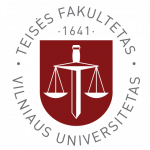
27–28 May 2021: Vilnius University Faculty of Law hosted a conference, “Investment Arbitration Reform and the Termination of Intra-EU Bilateral Investment Treaties”, discussing the status of Investor-State Dispute Settlement in Europe with the emphasis on its Eastern region. Dr Inga Martinkutė (Vilnius University) moderated the first panel of speakers focusing on the main narratives and tensions. Prof Solveiga Palevičienė (Mykolas Romeris University) moderated the second panel covering the Eastern European perspectives on investment arbitration and investment law in general. The third panel moderated by Dr Eglė Zemlytė (Vilnius University) focused on the termination of the Intra-EU BITs and the EU external investment treaties. During the final panel, Dr Rimantas Daujotas (Vilnius University) discussed with the speakers the practical impact of the EU investment protection reform on possible future investment disputes. Also, we have a more detailed report if you need it. The video recordings of all four panels can be found here
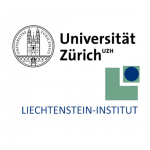
20 and 21 May 2021: The 4thYoung European Law Scholars Conference, co-hosted by the University of Zurich and the Liechtenstein Institute, was held online. Thirteen young European law scholars from six different European countries presented their papers on the preambles of European treaties, such as the Treaties of the European Union, the Euratom Treaty, the UK-EU Withdrawal Agreement, the European Convention on Human Rights and the treaties of the European Social Charter System. Each presentation was commented by a European law professor. This conference set-up enabled fruitful and stimulating discussions. The conference programme was complemented by an evening keynote speech by Professor Juliane Kokott, Advocate General at the Court of Justice of the EU. The conference was organised by Christina Neier, Odile Ammann, Reto Walther, Marisa Beier and Katja Achermann, five postdoctoral and doctoral researchers at the University of Zurich/University of Cambridge.

11 May 2021: The European University Institute in cooperation with Roma Tre University hosted an ESIL supported webinar on “European Approaches to International Law in a Historical Perspective: Taking Stock of some Contemporary Appraisals”. The webinar engaged in a critical reflection on the characteristics of national approaches to international law from the perspective of broader debates in the history of international law. The first session featuring Martti Koskenniemi, Inge Van Hulle, and Jean-Marc Thouvenin, and moderated by Neha Jain, focused on overarching conceptual and methodological issues. The second session moderated by Lauri Mälksoo was an informal roundtable with some of the most prominent scholars in this area: Peter Hilpold, Iulia Motoc, Ignacio de la Rasilla del Moral, Vincent Genin, and Giulio Bartolini. Veronika Bilkova delivered the closing remarks. It is hoped that this initial conversation will help generate future research on multiple national contexts both within and beyond Europe.
7. ESIL Series
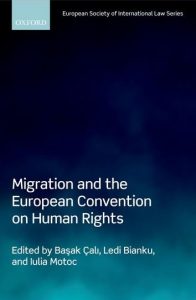 In 2017, ESIL and OUP established a book series to publish high-quality volumes on the themes of ESIL events. So far, four volumes have been published, namely
In 2017, ESIL and OUP established a book series to publish high-quality volumes on the themes of ESIL events. So far, four volumes have been published, namely
-The Judicialization of International Law. A Mixed Blessing?, edited by Andreas Follesdal and Geir Ulfstein (2018)
-The European Convention on Human Rights and General International Law, edited by Anne van Aaken and Iulia Motoc (2018)
-How International Law Works in Times of Crisis, edited by George Ulrich and Ineta Ziemele (2019)
-Migration and the European Convention on Human Rights, edited by Başak Çalı, Ledi Bianku, and Iulia Motoc.
Further books are in the pipeline, including edited volumes on ‘The Protection of General Interests in Contemporary International Law’, ‘Secondary Rules of Primary Importance’ and ‘International Law and Universality’. For more information, please visit the Series website.
A video of the book launch for ‘Migration and the European Convention on Human Rights’, the most recent volume in the series, is available here.
If you are interested in putting together a volume for inclusion in the series, please email the General Series Editor, Christian J. Tams (Christian.Tams@glasgow.ac.uk).
8. ESIL Reflections
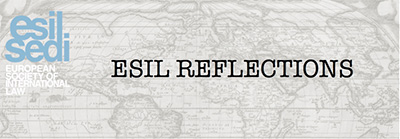 ESIL Reflections are short papers published on the website of the European Society of International Law (ESIL). ESIL Reflections offer up-to-date reflections on current issues in international law.
ESIL Reflections are short papers published on the website of the European Society of International Law (ESIL). ESIL Reflections offer up-to-date reflections on current issues in international law.
The Reflections cover a wide range of topics relating to current developments in international law and practice as well as theoretical reflections in a way that is relatively accessible to non-experts. The aim is to foster discussion between ESIL members and international law scholars and practitioners more generally – in Europe, but also beyond. ESIL Reflections are published online and distributed freely to ESIL members.
The editors are Federico Casolari, Patrycja Grzebyk, Ellen Hey, Guy Sinclair and Ramses Wessel (editor-in-chief).
ESIL Reflections are short papers (3000-4000 words) that argue one particular point that may trigger further debate in the scientific community. Extensive referencing is to be avoided. References are only necessary in case of direct citations or when new or less well-known works are mentioned.
Latest publications are:
- GATS the way / I like it WTO Law, Review of EU Legality and Fundamental Rights by Filippo Fontanelli
- ‘Kind of Green’. The U.S. Proposal to Advance Sustainability through Trade Rules and the Future of the WTO by Elena Cima and Makane Moïse Mbengue
9. 2021 ESIL Satisfaction Survey

ESIL is a member-based association. Its purpose is to bring together international law researchers, scholars and practitioners from both Europe and other parts of the world, and to provide a platform for an in-depth exchange of ideas amongst them. The Society aims to foster inquiry, discussion and innovation in international law, and to promote a greater understanding of the role of international law in the world today.
To assess whether the society succeeds in doing so or whether there is any room for improvement, the ESIL Secretariat sent a satisfaction survey in March 2021 to all current ESIL members. 169 ESIL members took part in the survey. Read the report here.
10. News from Interest Groups
 ESIL Interest Groups are a vital part of the Society’s success and activities. A list of the groups is available on the ESIL website.
ESIL Interest Groups are a vital part of the Society’s success and activities. A list of the groups is available on the ESIL website.
Interest Group on International Law of Culture
The IG on IL of Culture convened an online workshop on “Searching Solidarity for Fighting against Cultural Exclusion towards Migrants and Refugees in Europe in Times of Populism” in the framework of the 2021 Catania Research Forum. It showed the need for a “holistic approach” for the integration processes and the preference for an “intersectional approach” in the shaping of more inclusive migration policies. In the context of the Stockholm 2021 ESIL Annual Conference the IG will convey a workshop on “Methodology of Teaching, Researching and Practising International Law of Culture: Good Practices and Lessons Learned.”
Interest Group on European and International Rule of Law
On 8 September 2021, the newly founded ESIL Interest Group on the European and International Rule of Law will hold its kick-off meeting entitled “The Future of European and International Rule of Law Research” as an online side event of the 2021 ESIL Annual Conference. The event will combine a discussion on key issues, approaches and the relevance of future European and int’l rule of law research, featuring two input presentations by Werner Schroeder and Joelle Grogan, as well as an interactive group meeting to discuss the IG’s future agenda and activities. For more information, visit the IG’s website: https://esil-sedi.eu/interest-group-on-the-rule-of-law/.
Interest Group on International Economic Law
We are happy to welcome you at the IG’s pre-conference workshop “International Economic Law ‘In The Making’: New Actors and Policies” on 8 September 2021 as a side event of the 2021 ESIL Annual Conference to be held in Stockholm. We have successfully completed the selection of abstracts following our call for papers and the final programme is now available. Please visit the Conference website for details on the registration! We are also planning other events: check regularly the ESIL IG’s webpage for more information!
Interest Group on Peace and Security
The IG on Peace and Security ran a successful side event to the RF at Catania in April 2021. In line with the forum, the event focused on solidarity and drew a range of early career and established scholars as speakers. The event was chaired by our new co-conveners, Erin Pobjie and Patryk Labuda, who were elected to the committee in January 2021. Our next event will be a pre-conference workshop before the ESIL Annual Conference 2021. With a range of speakers focusing on the changes lawmaking has undergone in recent times, the event promises to be highly engaging!
Interest Group on the Law of the Sea
We, the IG on the Law of the Sea, are happy to announce the launch of our webinar series on ‘Current Issues in the Law of the Sea’. This series consists of five seminars, that take place on Thursdays, every two weeks from mid-May to mid-July 2021, from 11.30am-12.30 CEST. Our five speakers each address a topic of their choice, which represents a current issue in the law of the sea, for 30 minutes, after which a Q&A session of 30 minutes follows. These webinars are meant to be interactive, and we look forward to seeing you there! MORE INFO
11. Welcome to our new ESIL lifetime member

We are delighted to welcome a new ESIL Lifetime Member: Larissa van den Herik
Professor of Public International Law at the Grotius Centre for International Legal Studies – Leiden University.

